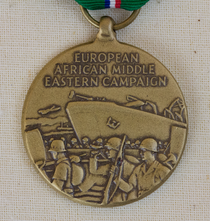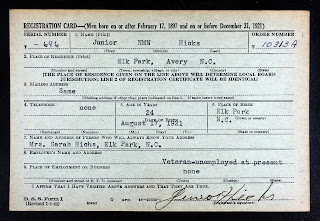The officer home that Junior Hicks and wife Frank and toddler daughter Rayna lived in for a few months.
Junior Hicks is my granduncle. He had an amazing life full of history. He was born August 17,1921 in Elk Park, North Carolina. When he was 14, he began driving cars and became indispensable to the Elk Park community by driving school buses and trucks for various stores.
At 20 years old, Junior enlisted into the Army, on September 3rd, 1941 where he was immediately sent to Fort Chickmunga and his knowledge of mechanics and driving skills had him quickly promoted to a driver for the major at the fort within a few months, level 2. A month later, he was a level 3 warranty officer and moved to the Officer homes and no longer in the barracks. 6 months later, he was a level 4 technician warranty officer, responsible for getting everyone out of the barracks each morning and teaching others how to keep the army vehicles running smoothly.
In April, Junior got R&R and coincidentally, this is when he married Frankie Carrie Turbyfill, April 18, 1942. I wonder if Junior wrote letters to my aunt Frankie while he was overseas. Oh to be able to get a peek at those letters if they exist.
Junior’s serial number was 14063575 and with this I was able to find what he did during the war. Operation Torch, January 1943-May 1943, Morocco was invaded by the Axis powers. Junior, along with many others in his unit were loaned to General Patton. Casablaca had already been freed of Axis powers by the time Junior arrived. Junior was put to work instructing and overseeing infantry in tuning up all the vehicles. The sands were harsh on the vehicles and prone to needing frequent maintenance. They then all headed to Tunisia so they could push back the Axis powers, but an attack at Djedeida pushed them back . They retreated to Tripoli to regroup. On February 14, 1943, they were further pushed back through the Kasserine Pass. This setback forced General Patton to command his men to wear American uniforms to disguise the fact they were British, and they tried again to free Tunisia of Axis control and failed again.
They called for ships to come pick them up in Casablanca and during those two months, Junior took in the sights of Casablanca and commanded the mechanics keeping the amphibian car/boats running and ready for the upcoming campaign. The ships arrived in June and Junior was responsible for loading all the vehicles onto the ships in the best order. He had a knack for making sure things fit and would be quickly deployed. Tanks, amphibian vehicles, jeeps, trucks, etc. All kinds of vehicles fell under Junior’s responsibility. While in battle, he drove one of the tanks and called out commands over the radios. He reported to Sir Harold Alexander, who reported to George Patton.
In June, the platoon took the ships around the coast to attempt to free Tunisia again and this time they succeeded. 10,000 Germans and 20,000 Italians surrendered and abandoned their tanks, jeeps, etc. Junior would go over to each vehicle and get it ready to be claimed and he organized, instructed, and got all them back onto the ship to take back to England.
Junior stayed in Tunisia to prepare for the next operation. On july 9th, their troops headed to Sicily as part of Operation Husky. They drove out Benito Mussolini and freed Silicy from Axis control. This time, Junior was in a Sherman tank but commanded the other amphibian vehicles as they all left the ship to land on Silician shores. Junior reported to Harold Alexander still. The next day, Junior pushed Axis powers away from the lighthouse so that the Special Air Service could capture the lighthouse. Once they successfully captured the lighthouse, from the high perch, the snipers from that division helped the 6th free Sicily.
From July 12 to October 5, 1943, Junior earned leave and he went back home. Let’s say their first daughter was born May 8, 1944. Wink wink. Junior and Frankie must have been ecstatic to see each other, as Frankie barely saw him during the first year they were married.
From October 1943 to June 1944, Junior was in Sicily helping the Sicilians get situated and reclaiming their land, clearing the rubble, and such. In June 1944, Junior was called to help capture Rome due to the troops in Italy being unable to get up to Rome due to the land being of excellent defense positions for the Axis powers. They needed to do another surprise landing. The ships arrived in Sicily to pick up Junior and his troop, as they needed someone to drive the tanks. On June 4, 1944 in the dark, they broke through Monte Cassino and on to Rome. This was called Operation Buffalo. Then the tanks were commanded to push the Italians up north to Pisa. This is the same day D-Day at Normandy was happening. And also possibly during this time, he got a letter he had a baby girl born.
In July, Junior was sent to Omaha Beach to help with the logistics and planning of where supplies go, as the person originally responsible for this was killed in action during D-Day. Junior spent a month being responsible for the logistics of supplies until he could be replaced, then he was sent to Saint Tropez for another surprise landing. This was called Operation Dragoon. Junior drove a tank from Saint Tropez to Touloun, liberating the French along the way.
From Touloun, Junior commanded a fleet of tanks, leading a convoy to Paris, the headquarters. Once he arrived in Paris, he stayed there for 6 months, from August 1944 to January 1945. During his time in Paris, he oversaw the maintenance of all the vehicles. Being the headquarters of the Allied Powers, nearly all the vehicles were in Paris at some point and Junior was responsible for ensuring all were ready to go.
In January 1945, Junior was called to the famous Battle of Bugle, there is a lot of footage of this battle, however, Junior was driving a tank, so his face wouldn’t be in there unless he stuck his head out for a photo. In December, some Allied troops were trapped somehow and they had a huge supply problem. Junior was good at solving the logistical issues, and he realized a tank could be the solution, because they’re not as vulnerable as trucks. Junior laid out the logistics where a truck from Paris would meet them at a safe point halfway between the Battle of Bugle and they’d load the supplies into the tank, making it really cramped. Junior used the tank to protect himself and his men as they drove back and forth bringing supplies, as the limited space meant more trips. His division was in Schmidt, Belgium and I believe the halfway point was Brussels, Belgium. .
Junior was so useful in this role, he was put in charge of logistics of getting the tanks to where they are wanted, laden with supplies. He was able to maximize the space within with creative arranging. He was made a supply chain management and promoted to Level 5, the highest rank within the technical command. During most of 1945, Junior helped coordinate the supply chain. On August 6, 1945, he was sent to Port Cherbourg, France to serve under General Sommervell.
Thus, when Hiroshima was bombed, Junior was in Port Cherbourg.
From August 6, 1945 to December 1945, Junior was responsible for getting all the POWs out of Europe and onto the United States. His talent for logistics meant he would look at the space each ship had and placed the correct number to not underload or overcrowd them and he would make sure the ones that were wounded would have space to be laid down and attended to by nurses. He would instruct people in how and where to set up bunks on the ships that were meant to be cargo ships, therefore, no lodging. He would also load supplies headed back to the US on the ship. He also helped drive the tanks onto the ships to be taken out of Europe now that the war was over. He stayed in France until every last American POWs were out of Europe and he embarked the last ship to leave on January 8, 1946. He disembarked in Hoboken, New Jersey and took a train to Fort Oglethorpe and lived in the Officers house in Park Chickamauga.
Junior was awarded the American Theater Service Medal, the EAME service medal, the Bronze Star, the Good Conduct Medal, and the World War II Victory Medal. On January 12, 1946, he was joined by his wife and his 20 month old daughter and they lived in the Officer housing. I wonder how he felt seeing his daughter for the first time. Was he ecstatic or kind of sad he missed out on the baby phase. I wish I could ask Frankie and Junior, but they’ve gone on to Jesus’ arms.
He mustered out on February 8, 1946 then the Hicks family moved back home to Elk Park, North Carolina. By May 1946, Junior had a job driving the school bus. Frankie and Junior quickly had two more children, two boys in 1947 and 1949. Ten years later, they welcomed their final child, a girl in 1949.
In 1959, something happened and he was no longer able to drive the school bus, so he moved to Detroit to find work. AHe was back home on February 6, 1960 when he started working for the local rescue organization. On December 22, 1961, Junior Hicks rescued a group of stranded duck hunters off an island when the ice they had walked across unexpectedly broke and they couldn’t walk back across. Junior rescued Joe Friday, Monroe Ellis, Ted Russell, Ray Rhoton, and Paul Lilly, Charles Cash. They all were very appreciative that Junior somehow noticed their dilemma and worked out the logistics of how to rescue them safely.
At 41 years old on January 23, 1963, Junior had a serious accident. So serious that he needed open brain surgery and more surgeries thereafter. AHis first surgery was at the hospital in Banner Elk, then the other surgeries in 1964, 1965, 1967, and 1970 were all at the VA in Johnson City, Tennessee. I asked his daughter Rayna if she remembers this and she does. That’s why he was in a wheelchair the whole time I’ve known him. After the 1970 surgery, he had complications leading to a long stay in the VA. He was discharged 17 months later on July 25, 1972 and his wife Frankie cared for him in the home.
Junior passed away when I was 6 years old, so I barely remember him. He was always in a wheelchair whenever I visited and now I understand why. He passed away on September 20, 1987 and I will never forget him.












No comments:
Post a Comment